Real Estate Projections: Expert Insights on 2024 House Predictions
Forecasting the Future: Expert Perspectives on 2024 Residential Real Estate Trends

In the rapidly evolving landscape of real estate, our 2024 house predictions indicate significant change. Shifts in market dynamics, innovative technologies, and housing policies will redefine the industry.
Stay ahead with our comprehensive analysis and insights into the future of the housing market. Your key to unlocking real estate opportunities in 2024 and beyond Navigate your real estate journey with confidence.
The 2024 housing market: Brace for impact
Can you believe it's already 2023? It seems like just yesterday that we were trying to predict what 2021 would bring. Now we find ourselves gazing into the crystal ball once again, trying to divine what the 2024 housing market has in store.
And let me tell you, folks, the tea leaves are looking a bit murky. Experts seem divided on whether home prices will continue skyrocketing or finally cool off. Mortgage rates could spike or plateau. The economy might boom or bust. So how's an aspiring homeowner supposed to make heads or tails of 2024 house predictions?
Dear reader, that's where I come in. I've gathered insights from the top housing economists, real estate analysts, and market soothsayers to piece together the puzzle. Lean in closer while I walk you through the key factors that will shape the 2024 housing landscape.
Some key factors that generally impact the housing market include:
Interest rates: As rates rise, mortgage rates typically rise as well, making homes less affordable. The direction of rates in 2024 will impact housing demand.
Job growth: A strong job market and rising wages support housing demand by giving buyers the income needed to purchase homes. Employment trends in 2024 will be important.
Demographics: Homeownership rates and housing preferences vary by age. Shifts in demographics, such as aging Baby Boomers and Millennials forming households, influence housing demand.
Inventory: The supply of homes for sale impacts prices and availability. Inventory has been tight in recent years. Builders' responses in the coming years will help determine inventory in 2024.
Affordability: High prices and mortgage rates reduce affordability. Measures like price-to-income ratios indicate when housing becomes too expensive for many buyers.
New vs. existing sales: The balance between new construction and resales provides insights into supply conditions. Permitting and construction rates now signal future new housing supply.
Regional trends: Housing markets are local. Economic and population growth patterns across cities, states, and regions shape local housing demand and prices.
New home sales: correlation with housing market trends
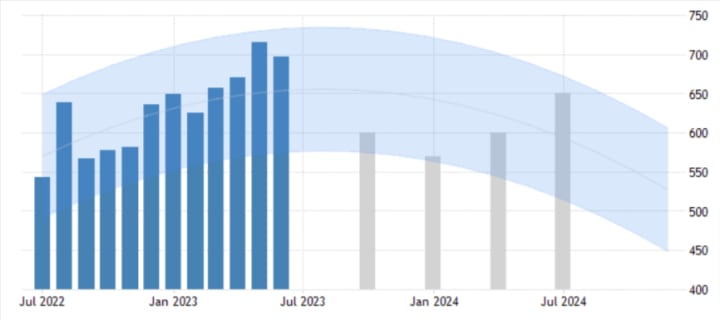
New home sales serve as lead indicators, so paying close attention to them can tip us off to trends 'for 2024. Affordability index numbers matter too. If mortgages eat up a hefty chunk of folks' income, it could mean a slower 2024 for house sales.
Existing-home sales data: What it suggests about 2024 House Predictions
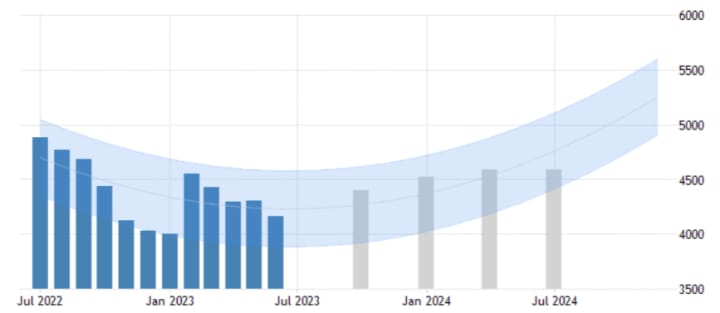
Existing-home sales show what's happening right now. While they ain't always predictive, they do point out if 2024 house predictions are way off base or kind of on track. Mortgage rates often determine if folks can afford to buy, so keeping a close eye on changes there is crucial in making 2024 house predictions.
Projecting trends in pending home sales data
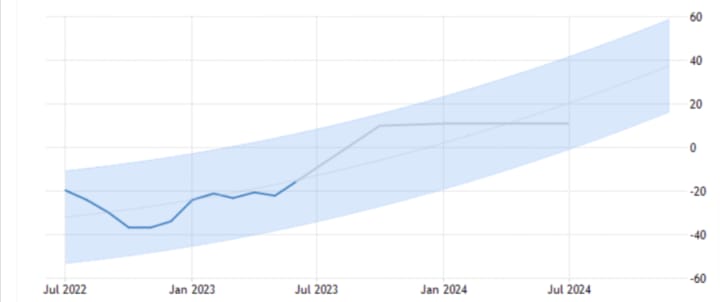
Pending home sales—between offer and close—suggest early momentum. So any shifts there signal factors like inventory impacting the 2024 house market. Inflation also messes with affordability in a major way. So retail prices for goods and services could drastically change.
Inflation and Recession Wild Cards
Like storm clouds gathering on the horizon, we'd be remiss not to discuss some potential downside risks. Specifically, the twin threats of higher inflation or economic recession.
Runaway inflation could force the Fed to rapidly hike rates into restrictive territory. This shock treatment would reverberate through the economy, potentially triggering a recession.
History shows that recessions can slam the brakes on the housing market. During 2008's subprime mortgage crisis, home prices fell almost 30% nationally.
While a 2008-style crash seems unlikely, a recession would certainly cool the jets on the red-hot housing market. Price drops in the 5–10% range can't be ruled out if the economy backslides in 2024.
The Impact of Inflation on the Housing Market
When forecasting the housing market, it's critical to understand the broader economic forces at play. The big one we're eyeing now is inflation.
The last year saw a more than 7% increase in consumer prices, the biggest inflation rate in decades.
Historically, periods of high inflation tend to correlate with rising home prices.
But some experts believe inflation may cool in 2024 as supply chain kinks get worked out. If inflation moderates, the pressure on home prices could ease up.
On the flip side, the Federal Reserve is jacking up interest rates to combat inflation. Higher rates make mortgages pricier, which could price some buyers out of the market.
The Fed's balancing act will have huge implications for homebuyers in 2024. A slight oversteer into rate hike territory may lead to recession, whereas a soft landing could pave the way for a buoyant housing market.
Potential Impact of the Economic Recession on the Housing Market
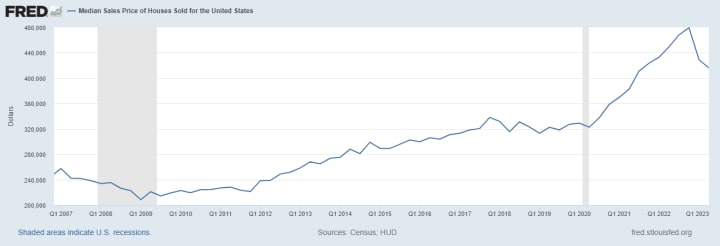
The housing market—its highs and lows, peaks and valleys—what's in store for 2024? Gazing into my crystal ball, some key trends emerge. Let's kick things off with a cold, hard look at how past recessions played out in real estate.
History repeats itself, right? When times got tough in the 2000s, specifically in 2008, housing took a major hit. Prices and sales plummeted big time. Foreclosures went through the roof. Not pretty. Now we're in the midst of another economic slump, thanks to the pandemic.
The million-dollar question is: how will this one impact the 2024 housing market? Experts have some forecasts, but the future is not set in stone. Overall, we are predicting a cooldown in demand and slowing price growth as the market normalizes post-pandemic. In moderation, this could actually benefit buyers.
Laying out the data visually helps put the market's ebbs and flows into perspective. Some key indicators to watch are mortgage rates, housing inventory, and affordability. Charts make it crystal clear: When rates drop, buyers pounce. More homes for sale give purchasers negotiating power.
And stretching budgets too thin is risky business. Looking ahead to 2024 house predictions, buyers and investors need to prepare for uncertainty. Recession or not, opportunities await savvy players. Consider up-and-coming neighborhoods before they blow up.
Search for hidden gems and diamonds in the rough. Have your finances in order to outbid competitors. The bottom line? The real estate terrain has peaks and valleys, but skilled navigators can traverse the landscape. Heed expert insights on market trends, yet stay flexible and ready to react.
With preparation and patience, you can thrive amidst 2024 house predictions, recession or none. The future remains unwritten; it's time to seize the day!
Crystal ball says...slowing but continued price growth

The consensus among experts is that demand for housing will remain strong in 2024, even as price growth decelerates. According to Skylar Olsen, chief economist at Zillow, home prices will continue to rise into 2024, which is good news for sellers but not so great for first-time buyers struggling to become homeowners.
However, there are predictions that home prices across the US could drop through the rest of 2023 and possibly into 2024. Fannie Mae revised its housing forecast and estimated that prices will decline by 1.2% during 2023, an improvement over the company's February prediction that prices would drop by 4.2%.
The updated housing projection also projects a 2.2% decrease in home prices in 2024, which is 0.1% less than it predicted in February. The persistent housing crisis in America is projected to increase demand for homes, counteracting the price reduction.
Accounting for these crosscurrents, the expert consensus expects housing demand to remain strong in 2024 even as price growth decelerates. Here are a few reasons why:
- Low interest rates: Low interest rates are anticipated to remain for the foreseeable future, according to the Federal Reserve.
- Millennial demand: The largest generation in history, the millennials, are entering their prime homebuying years. As they continue to establish their careers and start families, the demand for housing is expected to increase steadily.
- Limited housing supply: While demand remains strong, the supply of available housing is lagging behind. Homes are scarce on the market as a result of builders' struggles to meet demand. This imbalance between supply and demand is likely to continue driving prices up.
- Remote work trend: The COVID-19 pandemic has accelerated the trend of remote work, allowing people to live in areas they may not have considered before. This has created increased demand for housing in suburban and rural areas as people seek larger homes and more space.
- Immigration and population growth: Immigration to the United States has traditionally been common, and this pattern is anticipated to continue. Additionally, the overall population is projected to increase in the coming years, further driving housing demand.
- Economic recovery: As the economy continues to recover from the impacts of the pandemic, consumer confidence is growing. This, together with more job prospects, will probably result in a healthy housing market in the upcoming years.
While price growth may decelerate slightly, the overall consensus among experts is that housing demand will remain robust in 2024. These factors, combined with low interest rates, millennial demand, limited housing supply, the remote work trend, immigration and population growth, and the economic recovery, all point towards a continued strong housing market.
While bidding wars may become less common, experts still anticipate home prices rising by around 5% nationally in 2024. But this headline figure masks regional variations.
Hot markets like Austin and Boise could see double-digit gains, whereas cooler coastal cities stall out. As always, local conditions determine the best 2024 house predictions.
In-depth Data Visualization and Infographics

Here are some data points and details regarding real estate visualization, infographics, and house predictions:
- Visualizations can boost recall and comprehension of data by 65–80%. Infographics can increase learning retention by up to 65%. Visualizations can also make data two times more memorable.
- Real estate professionals who utilized data visualization saw an average 35% boost in sales volume, according to RE/MAX.
- Agents who used infographics experienced a 25% increase in social media engagement, as found in a HomeLight survey.
- According to data visualization by Realtor.com, home sales are expected to climb by 5.6% in 2023.
- Due to increased demand and a lack of available inventory, property prices are expected to climb 7.5%.
- Demographic data Visualizations can show projections of population growth or decline, household income changes, and age distribution shifts in specific neighborhoods. All of which impact the housing market.
- Interest rate forecasts in visual form can help clients understand how mortgage rates may impact their purchasing power and monthly payments.
- Maps and heat maps can illustrate housing trends in different pockets of a city, highlighting hot zones for price appreciation. They can highlight specific neighborhoods that will likely be in high demand.
- Pie charts, bar graphs, and line graphs are commonly used to visualize historical home sales data, price trends over time, and changes in the for-sale housing supply.
- Tools like ArcGIS, Tableau, InfoGram, Piktochart, and Venngage make it easy for real estate pros to turn their data into visualizations and infographics.
Here are some key points that visualization and infographics could highlight about the future real estate market in 2024:
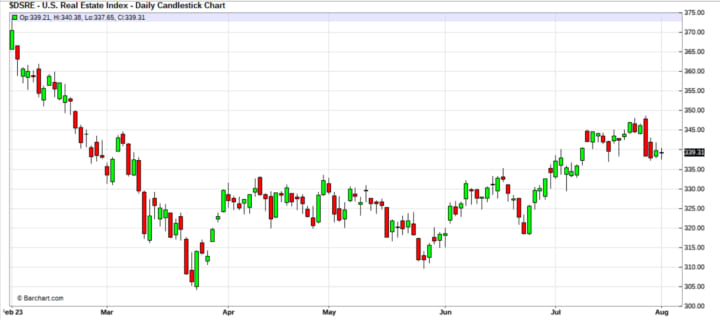
- Home ownership rates: Showing trends in home ownership rates over time could reveal if ownership is expected to increase or decrease by 2024. This could depend on factors like demographics, interest rates, and affordability.
- Housing inventory: Visualizing trends in housing inventory, particularly the supply of homes for sale, could show if the current undersupply is expected to improve or worsen by 2024. This affects home prices and buyer competition.
- Home prices: Infographics could illustrate projections for average home price growth from 2020 to 2024. Various factors like mortgage rates, housing supply, and demand will influence future price trends.
- Buyer demographics: Pie charts or other visualizations could showcase how the demographics of home buyers may shift by 2024, in terms of factors like age, income level, and household composition. This impacts the types of homes in demand.
- Remote work trends: Illustrating the potential impact of long-term remote work and hybrid schedules could show how this trend may reshape the real estate market. It could increase demand for vacation homes or suburban/rural properties.
- Mortgage rates: Showing projections for mortgage rates in 2024 and comparing to current rates would reveal how rates may impact affordability and home buyer budgets. Rising or falling rates impact what buyers can afford and how competitive the market will be.
Those are some of the key factors that visualization and infographics could highlight to explain the potential future state of the real estate market in 2024. The actual trends will depend on economic conditions, policies, and other factors that are difficult to predict that far in advance.
Preparing for 2024: Recommendations for Buyers and Investors
Crystal balls and tea leaves make for colorful metaphors, but savvy housing market observers also keep an eye trained on the data.
Here are some recommendations for home buyers and real estate investors looking ahead to the housing market in 2024:
For Home Buyers:
- Monitor mortgage rates and aim to buy when rates are low to maximize affordability. Over the upcoming several years, rates are anticipated to increase. Time your purchase to benefit from dips.
- Consider adjustable-rate mortgages (ARMs) to take advantage of lower short-term rates. But budget for potentially higher payments when the ARM resets.
- Look for opportunities in up-and-coming neighborhoods where price growth is likely. Avoid overpaying in areas that have experienced rapid short-term price spikes.
- Factor maintenance and renovation costs into your budget, especially for older homes. New construction may offer lower maintenance.
- Pay close attention to commuting costs and proximity to amenities that support your lifestyle when choosing a location.
For Real Estate Investors:
- Target affordable neighborhoods that offer cash flow potential and price appreciation. Focus on value plays rather than chasing high yields.
- Consider flipping homes in areas with high demand from first-time buyers. Cosmetic fixes can yield big returns.
- Invest in rental properties in areas with high job and population growth. Strong tenant demand will drive occupancy and rental rates.
- Look for hidden value-add opportunities, like subdivision potential for larger lots or zoning changes that increase allowable density.
- Based on local market conditions, diversify among several types of real estate, such as residential, commercial, industrial, and specialty assets.
The housing market can shift quickly, so remain flexible and ready to adjust your strategy as economic conditions evolve over the next few years. Focus on long-term demographic trends and finding undervalued properties.
Monitoring these data points can clue you in on momentum shifts before headlines hit. For example, a spike in new home supply could foreshadow price relief for frustrated buyers.
I'll continue decoding the numbers and distilling need-to-know housing insights as we embark on the voyage to 2024 House Predictions and beyond. But for now, a piece of advice—don't let the headlines rattle you.
Regardless of which way home prices trend in 2024, patience and financial preparation remain the keys to owning a home for the long term. Tune out the noise, crunch your own numbers, lean on trusted professionals, and don't be swayed by fear or FOMO. Easier said than done, I know!
The future is never certain, but with the right mindset, you can navigate 2024 with confidence. Here's to smooth sailing towards your real estate dreams!
FAQ
What are the expert projections for the 2024 housing market?
Expert projections for the 2024 housing market are varied. While some industry experts predict a downturn in the market, others think housing values will climb even though more slowly. Factors such as location, inflation control, and demographic changes can influence these predictions.
Can we anticipate more inventory becoming available on the market by 2024?
Yes. An increase in inventory is expected, which may provide some relief for buyers struggling with the current tight market conditions and high house prices.
What predictions are there regarding the affordability of housing by 2024?
Housing affordability is predicted to improve slightly despite the continued challenges of high monthly mortgage costs and low inventory levels. The conditions are expected to stabilize, which could be beneficial for first-time homebuyers.
What factors could contribute to the slowing pace of home price increases?
The slowdown in home price increases could be due to higher interest rates, more inventory becoming available on the market, and a slowdown in the rate of job growth.
How might changing demographics shape the housing market in 2024?
Changing demographics, such as the retirement of baby boomers and the peak homebuying years for millennials, could shape the housing market in 2024. Downsizing by retirees could create more opportunities for younger buyers to enter the market.
What is Fannie Mae's forecast for home sales, housing starts, and mortgage originations?
Fannie Mae forecasts a slightly more optimistic outlook for home sales in 2023. The forecast for housing starts has undergone an upward revision, indicating a positive trend in new construction activity. Purchase mortgage originations are projected to increase in line with the expected growth in home sales.
Conclusion
As we move closer to 2024, multiple factors will continue to influence the real estate market. While the trajectory may vary locally, broader trends such as demographic shifts, market stabilization, and the balance of affordability are critical items to be factored in when considering the "2024 House Predictions".
About the Creator
Naglaa Saleh
Our secrets time is a blog that covers diverse topics with a focus on providing objective and exclusive content.
Enjoyed the story? Support the Creator.
Subscribe for free to receive all their stories in your feed. You could also pledge your support or give them a one-off tip, letting them know you appreciate their work.






Comments
There are no comments for this story
Be the first to respond and start the conversation.